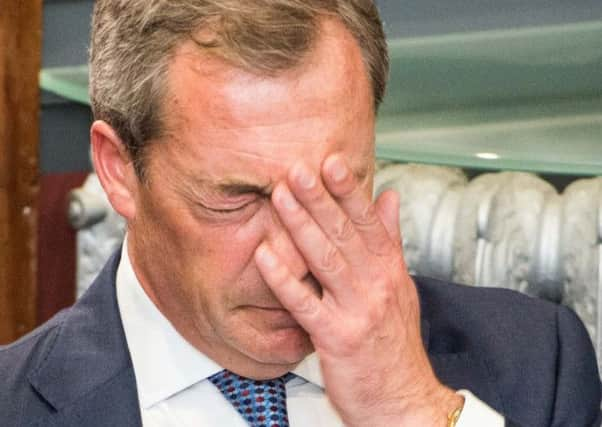Leaders: Nigel Farage shrinks as Ukip support dwindles


In one poll in late 2014 it was forecast that Ukip could take more than 120 seats, making them the third party by some margin. Even then that was probably fanciful, but it gives the flavour of those times.
But now it seems support for the party is dwindling. Despite a reasonable showing at the leaders’ debate, Nigel Farage appears to be concentrating his efforts on the seat for which he is standing, Thanet South, maybe as a consequence of the polls slipping against him.
Advertisement
Hide AdAdvertisement
Hide AdYesterday Mr Farage responded to his party’s slip in the polls by saying the party was exactly where it was at the polls last year at around 14 “and a bit” per cent. But even if it stays there, that would probably only bring two seats. That is nowhere near the 40-odd seats the SNP are widely forecast to get, and not even anywhere near the seats the Lib Dems are forecast to get.
Mr Farage refuses to be downhearted, saying there are 30 days to go and that he believes the issues on which Ukip is staking its arguments are coming into play. Well, he would say that, wouldn’t he. But is that the way it is likely to go?
It seems the greatest impact Ukip will have is just how many votes it takes from the Tories and Labour and how it affects the number of seats they will get. It is still close between the two main parties, with most polls forecasting that Labour will have the most seats but not a majority.
Some leading pollsters have estimated that Ukip will take three votes from the Tories for every one they take from Labour. No wonder then, that David Cameron has called for those traditional Tory voters to leave Ukip and come home to his party.
So, with his eyes firmly on those Tories, Mr Farage yesterday put himself forward as the man who would promote defence, a traditional Tory position. That, and Europe, he probably sees as his best chance of success.
But it has to be wondered how traditional Tory voters are seeing the choices before them. Some of the would-be switchers to Ukip will not be lured back because they have lost faith in the party under Cameron and feel their values are better reflected by Ukip. But many others will calculate that a vote for retreating Ukip might just give Labour the position of biggest party when there is a very real possibility that is within the grasp of the Conservatives. And if Labour do get there, it is most likely that a strong supporter – and eager for any concessions they could gain – would be the SNP, despite no formal coalition. That prospect would probably not appeal to them.
So it seems likely that Mr Farage’s impact on the election is simply going to continue to diminish.
Open debate proves a winner
Television debates have now become a fixed part of the election scene and they don’t just come along singly. Like buses, they come in packs. Last night saw the second of the 2015 general election televised debates, this time with the four leaders of the main Scottish parties. Somehow, after the seven players in the first – tightly packed on the stage – this one was a less crowded affair.
Advertisement
Hide AdAdvertisement
Hide AdThis was a different format – a town hall meeting, STV host Bernard Ponsonby called it – and the idea of putting the leaders individually in front of questions from the audience was a good one. Ruth Davidson managed to turn around the question about NHS funding on to the Scottish Government, so she will see that as a wining return.
Jim Murphy, jacket off in echoes of Tony Blair, reasoned the case for higher taxes and the tricky topic of nuclear weapons without too much damage.
Nicola Sturgeon might feel, rightly, that she faced a more hostile band of questioners than the others, but perhaps that’s the price you pay for being in power, although interesting none of the questions even alluded to the Scottish Government’s record. It was another polished and passionate performance from the SNP leader.
Willie Rennie probably feels hard done by for being held to account for criticism of MPs’ pay and the democratic deficit.
In terms of performance, there was no clear winner, but neither were there any disasters. So do these debates change minds? Probably not, most people probably go in with their views already formed, but they do give more insight and information. That is to be applauded.
FOLLOW US
SCOTSMAN TABLET AND MOBILE APPS